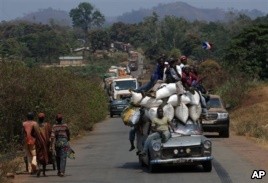voa常速英语:Some Food Aid Arrives in Bangui
WFP spokesman Alexis Masciarelli said the trucks arrived after being delayed at the Cameroonian border for nearly three weeks.

A vehicle filled with people and heavy load, precedes a convoy of over 100 trucks arriving in the Central African Republic capital Bangui from Cameroon, Monday Jan. 27, 2014. The trucks were loaded with military logistic for French forces and HumanitarianDrivers feared they would be attacked if they tried to make the trip to the capital.
“They left the border on Saturday and spent two nights on the road – that stretch of 600 kilometers of road between the border and Bangui,” he said.
The trucks carried 300 tons of cereals, including rice and maize meal.
“Initially, we will probably use that food for distribution here in Bangui, especially at the airport where there’s about 100 thousand displaced people living,” he said.
Masciarelli said that the food that arrived Monday represents barely 10 percent of what’s needed to feed all those in need for one month. Meanwhile, 30 more trucks are still at the border with thousands of tons of food aid. The drivers of those trucks, he said, are still afraid of being attacked.
“We are still in discussion with them trying to convince them that it is safe. We pressed also the African force here, MISCA, to continue providing escorts on that main road. It is really crucial for us that road is clear from insecurity. We’ve heard there are a lot of villages burned on the road. There are a lot of villages that are abandoned and many militias marauding along the road, as well.”
The World Food program is considering airlifting emergency supplies to Bangui, but only as a last resort. It’s much more expensive to fly in aid.
On Friday, the WFP resumed food distribution in and around the northwestern town of Bossangoa, hundreds of kilometers from Bangui. About 40,000 people need assistance
- 频道推荐
- |
- 全站推荐
- 推荐下载
- 网站推荐




















